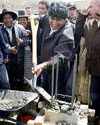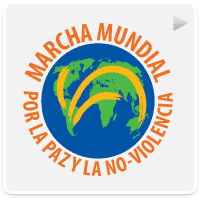The Invisibles against US missile defense
Bolivia, the non-violent revolution

In this article, the author analyses some of the factors that establish the “Bolivian Process”, led by President Evo Morales, as a peaceful, non-violent humanist process. A new revolutionary constitution that extends rights to more Bolivian citizens at home and abroad and Morales’ response to conflictive situation corroborate this assessment.
----
Pressenza, Madrid, 2009-09-21
When Evo Morales announced his support for the World March for Peace and Non-Violence in May he stated, “Of course we support the World March for Peace and Non-Violence. What cause could be more important?” If one analyses what he has done as President and as the visible leader of the Bolivian Process, it is clear that these were not hollow statements. He has achieved legislation and taken positions that propitiate the inclusion of all sectors of Bolivian society in a common project and chosen non-violence as his method of action.
There were many moments when President Morales, under pressure by racist and powerful elitist opposition groups, could have reacted by force. But even when there appeared to be no alternatives, he has always found peaceful solutions.
During the constitutional process, a significant part of the opposition devoted itself to boycotting any form of agreement, blocking the realization of the new constitution. It provoked violent confrontations, in hope of charging Morales’ government with casualties. One of the last legislative actions taken was related to the new electoral law. When the opposition provoked a complete deadlock in the process, the president decided to go on a hunger strike that he maintained until the law was approved.
Due to restrictions imposed by the opposition as a condition for its passage, this law designed to grant voting rights to Bolivian citizens residing outside the country will extend this franchise to only 6% of Bolivian immigrants abroad. However, it represents an advance over the prior state of affairs and a strengthening of Bolivian democracy.
Another article of the new constitution, approved by referendum over a year ago, explicitly rejects military action as a means of conflict resolution between countries. This constitution is the first in the Americas to include such an article and supposes an irrefutable advance in relations between countries.
In terms of the national economy, Bolivia’s hydrocarbon deposits are among its greatest natural resources. The exploitation of these assets was controlled by foreign companies. Morales decided to nationalize this sector, a measure that provoked the indignation of the foreign economic interest groups affected, but that has also returned the benefits of these assets to the Bolivian people. Nationalization has enabled the government to take actions to improve the quality of life of the poorest Bolivians, one example being the enactment of the popularly known “Ley de Renta Dignidad” that ensures a minimum pension to all Bolivians over the age of 60. In this context, it must be remembered that Bolivia is considered one of the poorest countries in the American continent.
When the MAS (Movimiento al Socialismo) party assumed power, a high percentage of the populace was illiterate. One of its major social achievements has been a literacy program that has reached 85% of the population.
Another sign of significant progress is the recognition of the distinct nationalities that make up the population of Bolivia. The official designation “Plurinational State of Bolivia” recognizes the rights and diversity of the different nations that together constitute the country. The implementation of resources necessary to teach the various native languages is an important step in eliminating the discrimination that almost all the ethnic groups suffered throughout Bolivia.
Eva Morales has not forgotten Bolivian citizens who live abroad either. In a gesture of commitment to those constituents who have been obliged to leave the country for economic reasons, and at the risk of diplomatic consequences, he issued a declaration in favor of immigrants’ rights that condemned the Return Directive, a directive adopted by Council of the European Union and Members of the European Parliament in 2008 that defined procedures for the forced return of illegally resident third-country nationals throughout the European Union. This directive has come to be popularly known as “The Shame Policy”.
The inclusion of the recognition of diversity in medical treatment within the constitution, that puts traditional Andean medicine on an equal footing with Western medicine, shows his respect for diversity and his understanding of its implications for his people.
The Bolivian government’s recognition of freedom of religion and of religious pluralism shows its respect for the personal beliefs of all people.
When the United Nations cited Evo Morales as an “Earth Hero”, it was an honor substantiated by a long history of dedication to the environment and a harmonious relationship between man and the Mother Earth, “la Pachamama”.
It is clear that the implementation of these measures and others has been possible because they have not sprung solely from a personal vision. Evo Morales is the voice of a structured and highly participative grass-roots movement with which he maintains a firm connection.
We hope that this non-violent revolution continues to prosper and widen its objectives, seeking a profound reconciliation for every Bolivian citizen and the country as a whole.
Long life to Evo Morales and the non-violent process underway in Bolivia!
(Translation by Jenni Lukac)
Pressenza IPA
« back









